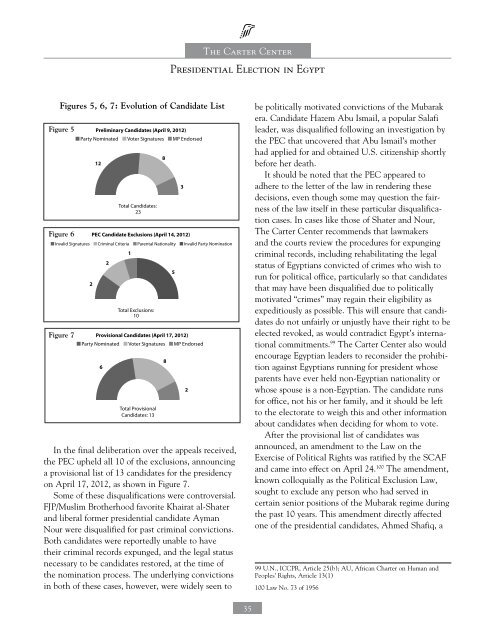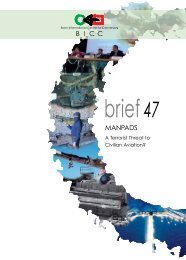egypt-final-presidential-elections-2012
egypt-final-presidential-elections-2012
egypt-final-presidential-elections-2012
Create successful ePaper yourself
Turn your PDF publications into a flip-book with our unique Google optimized e-Paper software.
The Carter Center<br />
Presidential Election in Egypt<br />
Figures 5, 6, 7: Evolution of Candidate List<br />
Figure 5<br />
Figure 6<br />
Preliminary Candidates (April 9, <strong>2012</strong>)<br />
Party Nominated Voter Signatures MP Endorsed<br />
12<br />
6<br />
Total Candidates:<br />
23<br />
PEC Candidate Exclusions (April 14, <strong>2012</strong>)<br />
Invalid Signatures Criminal Criteria Parental Nationality Invalid Party Nomination<br />
1<br />
2<br />
5<br />
Figure 7<br />
2<br />
Total Exclusions:<br />
10<br />
Provisional Candidates (April 17, <strong>2012</strong>)<br />
Party Nominated Voter Signatures MP Endorsed<br />
Total Provisional<br />
Candidates: 13<br />
In the <strong>final</strong> deliberation over the appeals received,<br />
the PEC upheld all 10 of the exclusions, announcing<br />
a provisional list of 13 candidates for the presidency<br />
on April 17, <strong>2012</strong>, as shown in Figure 7.<br />
Some of these disqualifications were controversial.<br />
FJP/Muslim Brotherhood favorite Khairat al-Shater<br />
and liberal former <strong>presidential</strong> candidate Ayman<br />
Nour were disqualified for past criminal convictions.<br />
Both candidates were reportedly unable to have<br />
their criminal records expunged, and the legal status<br />
necessary to be candidates restored, at the time of<br />
the nomination process. The underlying convictions<br />
in both of these cases, however, were widely seen to<br />
8<br />
8<br />
3<br />
2<br />
be politically motivated convictions of the Mubarak<br />
era. Candidate Hazem Abu Ismail, a popular Salafi<br />
leader, was disqualified following an investigation by<br />
the PEC that uncovered that Abu Ismail’s mother<br />
had applied for and obtained U.S. citizenship shortly<br />
before her death.<br />
It should be noted that the PEC appeared to<br />
adhere to the letter of the law in rendering these<br />
decisions, even though some may question the fairness<br />
of the law itself in these particular disqualification<br />
cases. In cases like those of Shater and Nour,<br />
The Carter Center recommends that lawmakers<br />
and the courts review the procedures for expunging<br />
criminal records, including rehabilitating the legal<br />
status of Egyptians convicted of crimes who wish to<br />
run for political office, particularly so that candidates<br />
that may have been disqualified due to politically<br />
motivated “crimes” may regain their eligibility as<br />
expeditiously as possible. This will ensure that candidates<br />
do not unfairly or unjustly have their right to be<br />
elected revoked, as would contradict Egypt’s international<br />
commitments. 99 The Carter Center also would<br />
encourage Egyptian leaders to reconsider the prohibition<br />
against Egyptians running for president whose<br />
parents have ever held non-Egyptian nationality or<br />
whose spouse is a non-Egyptian. The candidate runs<br />
for office, not his or her family, and it should be left<br />
to the electorate to weigh this and other information<br />
about candidates when deciding for whom to vote.<br />
After the provisional list of candidates was<br />
announced, an amendment to the Law on the<br />
Exercise of Political Rights was ratified by the SCAF<br />
and came into effect on April 24. 100 The amendment,<br />
known colloquially as the Political Exclusion Law,<br />
sought to exclude any person who had served in<br />
certain senior positions of the Mubarak regime during<br />
the past 10 years. This amendment directly affected<br />
one of the <strong>presidential</strong> candidates, Ahmed Shafiq, a<br />
99 U.N., ICCPR, Article 25(b); AU, African Charter on Human and<br />
Peoples’ Rights, Article 13(1)<br />
100 Law No. 73 of 1956<br />
35



